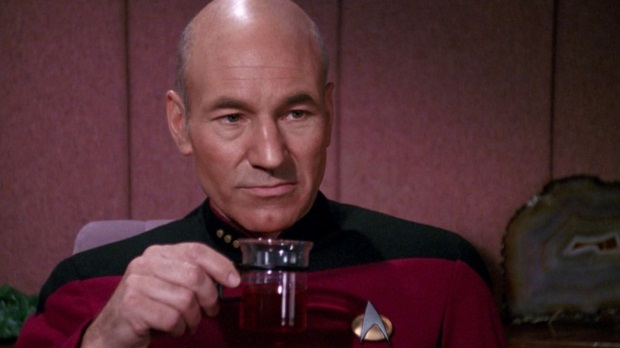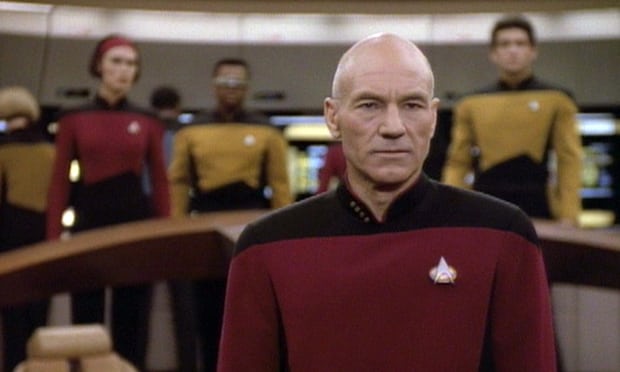Star Trek: What’s So Great About Captain Picard?
Patrick Stewart will return to the world of Star Trek: The Next Generation as Captain Jean-Luc Picard
This article comes from Den of Geek UK.
For a generation of Star Trek fans, the name Jean-Luc Picard is as synonymous with the franchise as the likes of James T. Kirk, Mr. Spock and the Enterprise herself. The news that CBS All Access is bringing Captain Picard back to television for his own solo series has the show’s fans demanding the producers give it all four (or was it five?) green lights as soon as possible.
read more: Why Star Trek: Picard Won’t Be Like The Last Jedi
But what allowed Picard to manoeuvre his way into our hearts and back onto our screens? Why has the character remained our number one even after almost two decades? And how can he engage with a world vastly different to the one he left behind?
Captain Picard’s appeal is easy to see – virtually every appearance makes a compelling argument for his success – but it’s also hard to explain. Not because it defies explanation, but because of the strange alchemy that is responsible for it. On paper, a middle-aged Frenchman (with an English accent) who doesn’t like children, can’t abide frivolity and spends most of his time mediating minor disputes isn’t your typical TV hero.
Unlike James T. Kirk, an Enterprise captain who wasn’t afraid to lead with his fists and always made sure he got whichever girl was closest to the action at the time, Picard was a quieter, more contemplative man. He liked archaeology, playing the flute and acting-out 400-year-old detective novels on a souped-up Oculus Rift. While his first officer spent his time courting the hottest piece of alien around, the only thing hot about Captain Picard was his cup of Earl Grey.

No, on paper, Captain Picard doesn’t sound like a heroic lead. He sounds like the kind of mealy-mouthed, conflict-averse apologist that the real hero should give a well-deserved sock in the jaw thirty seconds before the end of a story, before stealing his fiancée as his superiors fire him for cowardice.
But Picard’s penchant to avoid such easy resolutions is what ultimately made him endure. Where Kirk revelled in thinking on his feet, outwitting and outsmarting the enemy, Picard would retreat to his ready room to fiercely interrogate his options, comparing them against his own ideological and moral standards before coming a conclusion. He didn’t rebel against authority as a matter of course, but he refused to give it an easy ride – even when it was his own. When he made a decision, you knew he believed in it. In many ways it’s appropriate that he played the flute, because the one thing Picard never did was suck (ruling out the harmonica).
The genius of Captain Picard is that unlike so many leading men, he was allowed to be cerebral – and not just when it was time to demonstrate his intelligence. Episode after episode, he wrestled with his values. He stretched his beliefs until they broke. And he never forgot to extend compassion to those he opposed. Captain Kirk, popular though he was, spent more time wrestling with semi-clad women, stretching his shirts until they broke, and extending his balled-up fists to those he opposed.
Where Kirk exemplified the rough and chiselled leading man archetype of the sixties, Picard was more nuanced and evolved, reflecting the less certain times surrounding his creation. Picard’s creator may have been a military man, but Gene Roddenberry ensured he was a pacifist, keen to avoid conflict but never scared of it. Devoid of self-interest, Picard doesn’t care about his wealth, or his brand, or even his rank and commission: he cares only about what is right, and good, and that those who oppose these concepts are taught the lessons they need.

But that all sounds heroic enough, and we’ve already established that Picard is not a hero in the traditional sense. What sets him apart from the classic heroic model is that he isn’t a maverick, or an individualist. He’s not one man fighting to change a broken world. In fact, he lives his belief in co-operation and diplomacy. Like most of us, he has a core group of people he trusts, and to whom he listens, and he meets with them regularly (usually within the first fifteen minutes of any given episode – trust me on that) to exchange viewpoints. He’s the ideal boss: one who trusts the expertise of his subordinates, who isn’t afraid to challenge them to be better than they are, and who is first in line to protect them when something threatens them. Because he knows that we’re all stronger together.
Of course, we can’t praise Captain Picard without acknowledging the man who depicted him for fifteen years. Sir Patrick Stewart may have imbued the character with an air of sombre nobility, but the actor’s good humor and humble background cannot help but bleed through into the performance, giving Picard an empathy and kindness that can only come from those who have truly felt the weight of society on their backs. Other actors could have played Picard, but few, if any, could have brought him to life the same way.
As Captain Picard, Stewart gives us a role model the real world all too often lacks: someone who aspires to apply wisdom, reason and valour in the interest of fairness and progress. Someone as keen to help one person as he is to help one planet. We can only wonder what Picard would make of the precarious politics found on 21st century Earth, what lessons he might impart to a divided and fearful world, and what example he’d set for us to follow. The return of a Star Trek character like this is unexplored territory, and it’s hard to imagine exactly how Picard will work, removed from the context of his old crew and context.
But one thing we can be sure of: In a world ruled by narcissists, fanatics and ideologues, pop-culture needs a man like Jean-Luc Picard now, more than ever. Is there a danger of screwing up the character’s legacy? Of course. But is it worth the risk? To appropriate a turn of phrase from Picard’s beloved Shakespeare: nothing is definitely good or bad, but I’m thinking… make it so.
Read the latest Den of Geek Special Edition Magazine Here!